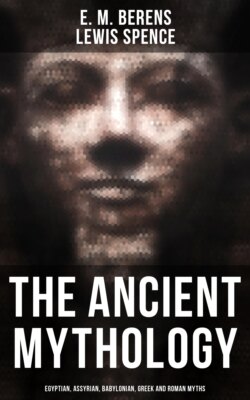Читать книгу The Ancient Mythology: Egyptian, Assyrian, Babylonian, Greek and Roman Myths - Lewis Spence - Страница 97
На сайте Литреса книга снята с продажи.
Hadad, Dáda, David, and Dido
ОглавлениеIn a curious and interesting passage in his Hibbert Lectures,1 Professor Sayce indicates resemblances between the name Hadad, Dáda, the abbreviated form of the name of Abd-Hadad, who reigned at Hierapolis in the fourth century, Queen Dido of Carthage, and that of the Biblical David. Speaking of Hadad he says: "He was, as I have said, the supreme Baal or Sun-god; whose worship extended southward from Carchemish to Edom and Palestine. At Damascus he was adored under the Assyrian name of Rimmon, and Zechariah (xii 11) alludes to the cult of the compound Hadad-Rimmon in the close neighbourhood of the great Canaanitish fortress of Megiddo. Coins bear the name of Abd-Hadad, 'the servant of Hadad,' who reigned in the fourth century at Hierapolis, the later successor of Carchemish, and, under the abbreviated form of Dáda, Shalmaneser speaks of 'the god Dáda of Aleppo' (Khalman). The abbreviated form was that current among the nations of the north; in the south it was confounded with the Semite word which appears in Assyrian as dadu, 'dear little child.' This is the word which we have in Be-Dad or Ben-Dad, 'the son of Dad,' the father of the Edomite Hadad; we have it also in the David of the Old Testament. David, or Dod, as the word ought to be read, which is sometimes written Dodo with the vocalic suffix of the nominative, is the masculine corresponding to a Phœnician goddess whose name means 'the beloved one,' and who was called Dido by the writers of Rome. Dido, in fact, was the consort of the Sun-god, conceived as Tammuz, 'the beloved son,' and was the presiding deity of Carthage, whom legend confounded with Elissa, the foundress of the city. In the article I have alluded to above, I expressed my conviction that the names of Dodo and David pointed to a worship of the Sun-god, under the title of 'the beloved one,' in southern Canaan as well as in Phœnicia. I had little idea at the time how soon my belief would be verified. Within the last year, the squeeze of the Moabite stone, now in the Louvre, has been subjected to a thorough examination by the German Professors Socin and Smend, with the result of correcting some of the received readings and of filling up some of the lacunæ. One of the most important discoveries that have been thus made is that the Israelites of the northern kingdom worshipped a Dodo or Dod by the side of Yahveh, or rather that they adored the supreme God under the name of Dodo as well as under that of Yahveh. Mesha, the Moabite king, in describing the victories which his god Chemosh had enabled him to gain over his Israelitish foes, tells us that he had carried away from Atarath 'the arel (or altar) of Dodo and dragged it before Chemosh,' and from Nebo 'the arels (or altars) of Yahveh,' which he likewise 'dragged before Chemosh.' Here the arel or 'altar' of Dodo is placed in parallelism with the arels of Yahveh; and it is quite clear, therefore, that Dodo, like Yahveh, was a name under which the deity was worshipped by the people of the land. I have suggested that Dod or Dodo was an old title of the supreme God in the Jebusite Jerusalem, and that hence Isaiah (v 1), when describing Jerusalem as the tower of the vineyard the Lord had planted in Israel, calls him Dôd-i, 'my beloved.' We can easily understand how a name of the kind, with such a signification, should have been transferred by popular affection from the Deity to the king of whom it is said that 'all Israel and Judah loved him' (I Sam. xviii 16)."
